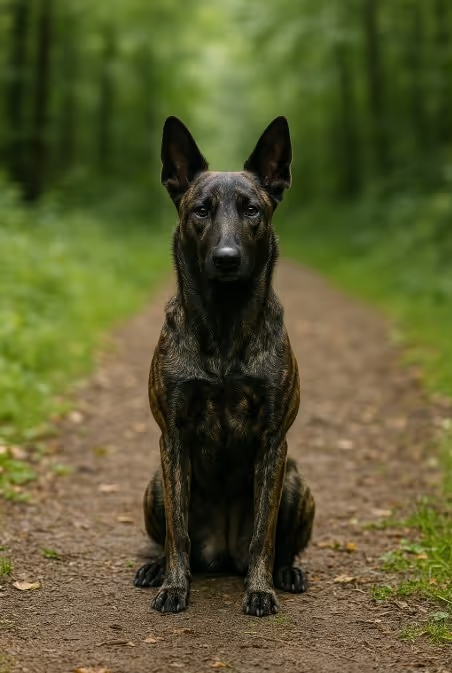The Dutch Shepherd is a highly intelligent and versatile working dog, known for its strong herding instincts, loyalty, and athleticism. Originally bred to herd sheep and guard farms, this breed thrives with active owners who can provide plenty of mental and physical stimulation. While not as common in Canada, the Dutch Shepherd is gaining popularity among police K9 units, sport handlers, and experienced pet owners looking for a trainable and devoted companion.

The Dutch Shepherd originated in the Netherlands in the 19th century as a multipurpose farm dog used for herding, guarding livestock, and pulling carts. It shares common ancestry with the Belgian Malinois and German Shepherd but was bred to adapt to the Dutch countryside’s unique terrain and farming needs. Nearly extinct by World War II, the breed was preserved by dedicated enthusiasts and is now used in modern police and protection work, as well as competitive dog sports.
A well-muscled, athletic dog with a striking brindle coat.
Grooming varies depending on coat type but is generally moderate.
Extremely high-energy and driven—daily physical and mental stimulation is a must.
Dutch Shepherds are fast learners and excel in structured training environments.
Support their lean muscle and stamina with a high-quality, protein-rich diet.
Generally healthy with robust genetics, though some concerns exist.
Still rare in Canada, but available through working-dog breeders and sport dog imports.
Are Dutch Shepherds good apartment dogs?
No—due to their high energy and working drive, they are best suited for homes with outdoor space and experienced owners.
Do Dutch Shepherds shed a lot?
Yes—especially the short- and long-haired varieties; expect seasonal coat blows and year-round moderate shedding.
Are Dutch Shepherds hypoallergenic?
No. They are not hypoallergenic.
Are Dutch Shepherds good family dogs?
With early socialization and firm leadership, they can be loyal family companions, but may not tolerate rough handling from small children.
Dutch Shepherd vs Belgian Malinois—what’s the difference?
Dutch Shepherds are generally calmer and more adaptable indoors, while Malinois are more intense and demanding in work.
Do Dutch Shepherds get along with other dogs?
They can, if socialized early, but same-sex aggression or strong guarding instincts may arise in some lines.
Are they good for first-time dog owners?
Not recommended—Dutch Shepherds require structure, confidence, and daily work to be fulfilled.
Do Dutch Shepherds bark a lot?
Moderately—they are alert and protective but can be trained to control barking.